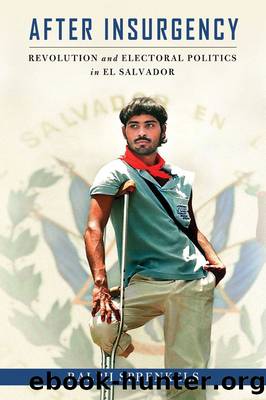After Insurgency: Revolution and Electoral Politics in El Salvador by Ralph Sprenkels

Author:Ralph Sprenkels [Sprenkels, Ralph]
Language: eng
Format: epub
Tags: history, Latin America, Central America
ISBN: 9780268103255
Google: mYtPswEACAAJ
Publisher: University of Notre Dame Press
Published: 2018-11-15T00:25:21.184524+00:00
Figure 6.10. ERP, Guazapa (1984)
Source: Photograph from the IEHAA-UES archive. Used by permission.
Figure 6.11. RN, demobilization camp near Suchitoto (1992)
Moisés believed that, similar to what happened with the ERP, his comrades at the RN suffered from a double rupture: the break-off of the RN from the FMLN and the RNâs internal decomposition. âWe ended up practically in the air,â he commented. As a result many former comrades had become bitter and had distanced themselves from politics, so Moisés thought. Moisés himself battled for several years to regain entry and acceptance into the FMLN, which he finally achieved through his involvement in NGO work. âThe peace accords,â he said, â⦠generated for us a huge ideological vacuum which the Right ably took advantage of, sowing discord to the extent that many who were heroic compañeros during the war were weak, very weak during peace time ⦠and hence were easy prey to the happiness of right wing fantasies.â56
For Beatriz, who spent most of the war working for the RN in Managua, the photograph of the RNâs demobilization process provoked mostly sadness, though also a hint of nostalgia for the loss of revolutionary innocence. For her, the idealistic image of the revolutionary struggle had already been dented by her personal experiences in Cuba and Nicaragua during the war. She remembered: â[After the war,] I began ⦠to hear some dreadful stories, to see the war-wounded, completely drunk, ⦠in sorry shape, abandoned ⦠and these others raising their own salaries in the legislative assembly and living a very normal and bourgeois life, and all the deaths from before not bothering them a bit.â57 Thus, the internal development of the revolutionary movement in postwar El Salvador provided further âfuel for [her] disenchantment.â
Where is the utopia? ⦠Iâm not saying that they did not believe in it, themselves, in a given moment or that they [some old revolutionary leaders] were fighting to make themselves millionaires. I know that ⦠back then it wasnât that way, but now it is terrible, because ⦠they became corrupted. It is so difficult to find someone who really maintains and defends his idealsâ¦. Radical discourse ⦠is effective because we live in a radical realityâ¦. That is, you can go to any barrio, ⦠and you will become radicalized because ⦠the social injustice is too much, there is too much shit going down to not say: âYes, Iâll take up arms ⦠,â and if you want an enemy, you can easily find oneâ¦. Too many differences, too much egoismâ¦. That is, those who have money are dreadful and those who become rich end up just the same way, this is the incredible part, they turn out just the sameâ¦. There is no difference.58
Download
This site does not store any files on its server. We only index and link to content provided by other sites. Please contact the content providers to delete copyright contents if any and email us, we'll remove relevant links or contents immediately.
| Africa | Americas |
| Arctic & Antarctica | Asia |
| Australia & Oceania | Europe |
| Middle East | Russia |
| United States | World |
| Ancient Civilizations | Military |
| Historical Study & Educational Resources |
Machine Learning at Scale with H2O by Gregory Keys | David Whiting(4295)
Never by Ken Follett(3937)
Fairy Tale by Stephen King(3370)
Oathbringer (The Stormlight Archive, Book 3) by Brandon Sanderson(3157)
The Man Who Died Twice by Richard Osman(3072)
Will by Will Smith(2911)
Rationality by Steven Pinker(2352)
Can't Hurt Me: Master Your Mind and Defy the Odds - Clean Edition by David Goggins(2324)
The Dark Hours by Michael Connelly(2300)
Friends, Lovers, and the Big Terrible Thing by Matthew Perry(2219)
The Dawn of Everything: A New History of Humanity by David Graeber & David Wengrow(2197)
Principles for Dealing With the Changing World Order: Why Nations Succeed and Fail by Ray Dalio(2039)
A Short History of War by Jeremy Black(1842)
HBR's 10 Must Reads 2022 by Harvard Business Review(1839)
Go Tell the Bees That I Am Gone by Diana Gabaldon(1754)
A Game of Thrones (The Illustrated Edition) by George R. R. Martin(1722)
Kingdom of Ash by Maas Sarah J(1668)
515945210 by Unknown(1660)
443319537 by Unknown(1545)
